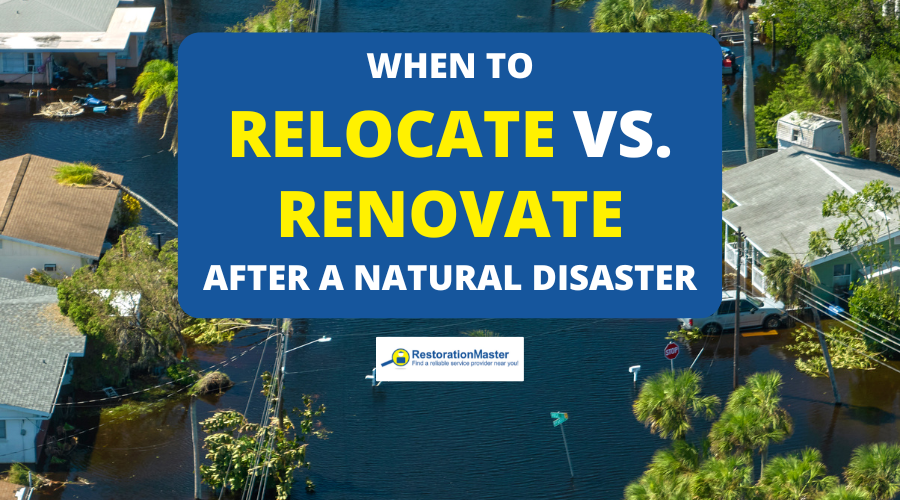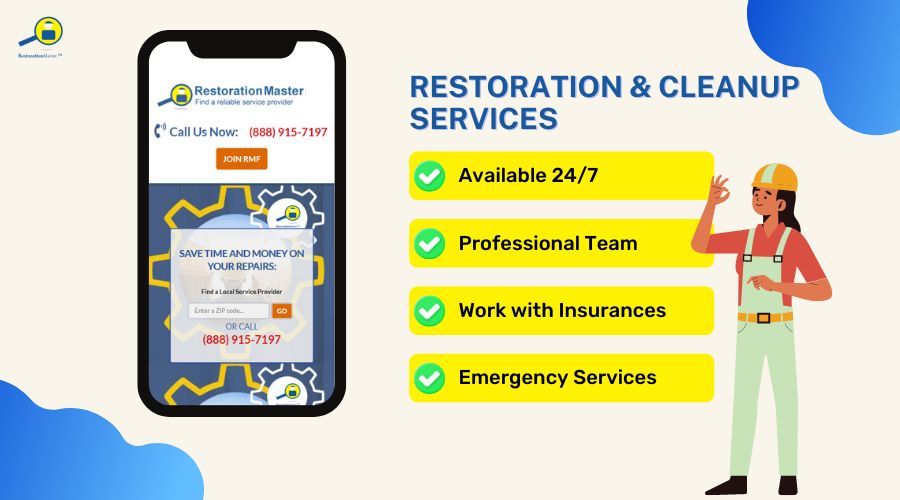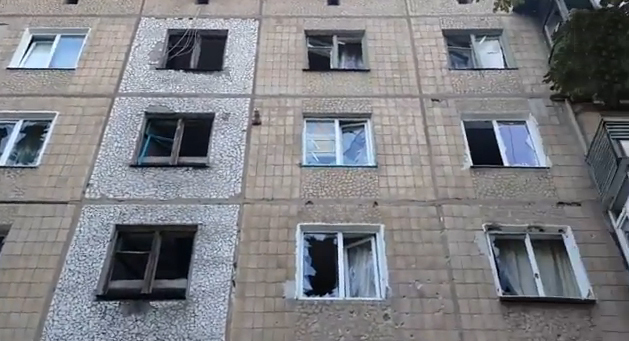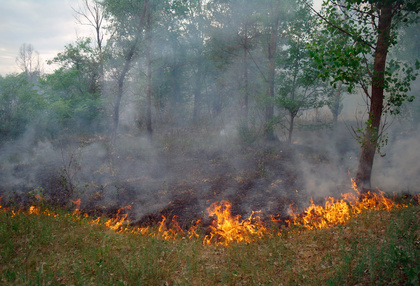When to Relocate vs. Renovate After a Natural Disaster

In 2023, 89 natural disasters occurred in the United States according to NOAA. These disasters included 28 weather and climate disasters, surpassing the record of 22 disasters in 2020. Most of these disasters were caused by severe storms, floodingFlooding is the overflow or accumulation of water in areas t... More events, tornadoes, and wildfires. If you live in certain parts of the country that are prone to severe weather, droughts, or fires, you should have a plan in place for keeping yourself and your family safe during such events.
The most unfortunate thing about natural disasters is that they cannot be prevented. You can (and should) prepare, but sometimes all of the preparationPreparation is the steps taken to ready a property, equipmen... More in the world won’t keep your home standing. It’s not something anyone wants to think about, but many people have to deal with expensive and extensive home damage after a natural disaster. Your first thought after getting back home might be, “How will we ever recover from this?”
One way or another, you will. But it’s important to know what the best recovery option is and whether you should relocate or renovate. Understanding the pros and cons of both options will make your decision easier, especially if you live in a high-risk area. So, when should you relocate and when should you renovate after a natural disaster?
What are the Pros and Cons of Renovating?
The idea of renovating a home that has been ravaged by a natural disaster can be overwhelming. Depending on the shape it’s in, you might not even know where to begin. There are a few things you should consider, though, before you make any decision:
- Is it cheaper to relocate or renovate?
- What is your emotional attachment to the house?
- What does the current real estate market look like?
- Is it the right time for your family to move?
Those questions can make it easier to decide whether to stay. Renovation is usually well worth the effort when it’s less expensive, but it’s okay to let the sentimental side of you take hold, too. If you have an attachment to your home and it’s where you want your kids to grow up, that can be a strong enough reason to stay.
The most important thing to determine right away is whether your home is safe upon your return. During your decision period, make sure your food and water supplies are protected so your family can stay safe and properly fueled. Making everyone’s safety a priority will give you a bit more time to consider your decision and determine what’s best.

There are plenty of pros to consider when it comes to renovating, even when it seems overwhelming. Some of them include:
- You can control the budget
- You can customize it the way you want
- You will be comfortable in your surroundings and have community support
While you might need to find a place to stay while the work is being done, renovating your home doesn’t have to be as overwhelming as it initially feels. Professional damage restoration services are available to help you in your restorationRestoration is the process of returning a property to its pr... More journey.
Is Relocating a Better Option?
There are a few situations in which relocating might seem like a better option, overall. Sometimes, a natural disaster can cause damage that exposes underlying issues in your home. For example, if you have an older house, the pipes could be wrapped in asbestos, or the same substance could be found within the walls. Asbestos exposure can cause scarring in your lung tissue and even leadLead is a heavy metal that can be toxic to humans, especiall... More to mesothelioma. Finding foundational damage could be another sign it’s time to move since the renovations will likely be expensive and take a long time to complete.
Even if you do decide to move, there are many things to consider. It’s not just about finding a new house to live in, it’s about relocating your family somewhere new. If you’re moving somewhere that’s less prone to disasters, everyone will have to get used to some changes and be willing to adapt to a new location. That’s not always easy, especially for young children. You’ll have to consider things like:
- Getting used to a new neighborhood
- Leaving friends and family
- Deciding on urban or rural living
- Creating a time frame for moving
- Knowing how to get around in a new place
It’s also important to estimate the costs. In most cases, renovating will always be cheaper than moving somewhere new, especially if the real estate market is favoring sellers.
If your safety is in question or if you have been considering a move already, relocating is a viable option. But it’s not a decision you should take lightly or make right away. Instead, give yourself time to think about some of these important considerations. Moving is a big step for a family, and it could have more of a negative impact than a positive one if you don’t take every aspect of relocating into account.
What is the Right Way to Renovate?
Renovating your home after a natural disaster is somewhat different than a voluntary renovation. The most important tip to keep in mind as you start the process is to be patient. Water damage doesn’t clear up overnight. Things won’t go back to normal right away.
By showing patience in your decision, you’ll feel more at ease and less overwhelmed with the projects at hand. Hiring a professional disaster restoration company can reduce stress.
Inspect your floors and walls and consider hiring a professional home inspector to walk through and let you know what needs to be done to keep your family safe.
Once you cover your safety bases, you can turn your renovation into a passion project. If the work is already being done, why not take the opportunity to paint your home the way you’ve always wanted, or add a few special touches that you’ve been meaning to get around to for a while? Doing those things now will keep you from dealing with future renovation stressors. Knowing that you’re able to add some “wants” in with the needs can make the process less stressful.
It’s hard to wrap your head around what to do after a natural disaster. Some pros and cons come with relocation and renovation, and the right option is different for everyone. But, if you want to save some money, if you love your current home, and if you don’t want to deal with some of the extra stress that comes with moving, don’t let the initial shock of having to renovate keep you from staying put. Keep yourself organized and manage your finances effectively, and you’ll discover the best option for your family.
How to Mitigate the Risks of Damage
Although you cannot prevent a natural disaster from happening, there are steps you can take to prevent extensive damage to your property. Mitigating the risks of damage can help you better evaluate the decision to relocate or renovate your home after facing a tornado, hurricane, storm, or other kinds of natural disasters.
Take Inventory
After a natural disaster, your insurance company will ask you to provide a detailed list of damaged items. Keeping a list of the items in your home can speed up the insurance claim process while also making sure you don’t miss anything important. Include a list, images, and other documentation that mention the brand, model, and serial numbers when applicable.
Regularly Maintain Your Surroundings
Overgrown trees and shrubs near your home can become extremely hazardous during storms, potentially knocking down powerlines or damaging your property. Inspect and maintain these areas to reduce the risks of further damage.
Follow Code Compliance
Buildings should follow the current building codes to ensure preparationPreparation is the steps taken to ready a property, equipmen... More for disasters. Often times you can schedule an inspectionInspection is the careful examination and assessment of a pr... More for your home or business to identify where extra precautions could help minimize potential damage.
Repair and Replace
Property owners should not wait to fix old or damaged materials on the property. It is important to repairRepair is the act of fixing or restoring damaged property, m... More or replace items such as siding, soffits, shingles, and bricks as they are more susceptible to damage during natural disasters.
When in Doubt, Contact Restoration Professionals

When disaster strikes, professional disaster restorationRestoration is the process of returning a property to its pr... More professionals are here to help. Professional technicians offer a variety of restorationRestoration is the process of returning a property to its pr... More services such as water damage restoration, fire damage restorationFire damage restoration is the process of repairing and rest... More, mold remediationMold remediation is the process of identifying, removing, an... More, and reconstruction services.
At RestorationMaster, we are dedicated to helping you recover quickly and efficiently. We provide comprehensive restorationRestoration is the process of returning a property to its pr... More services to bring your property back to its pre-damage condition, no matter the size.












